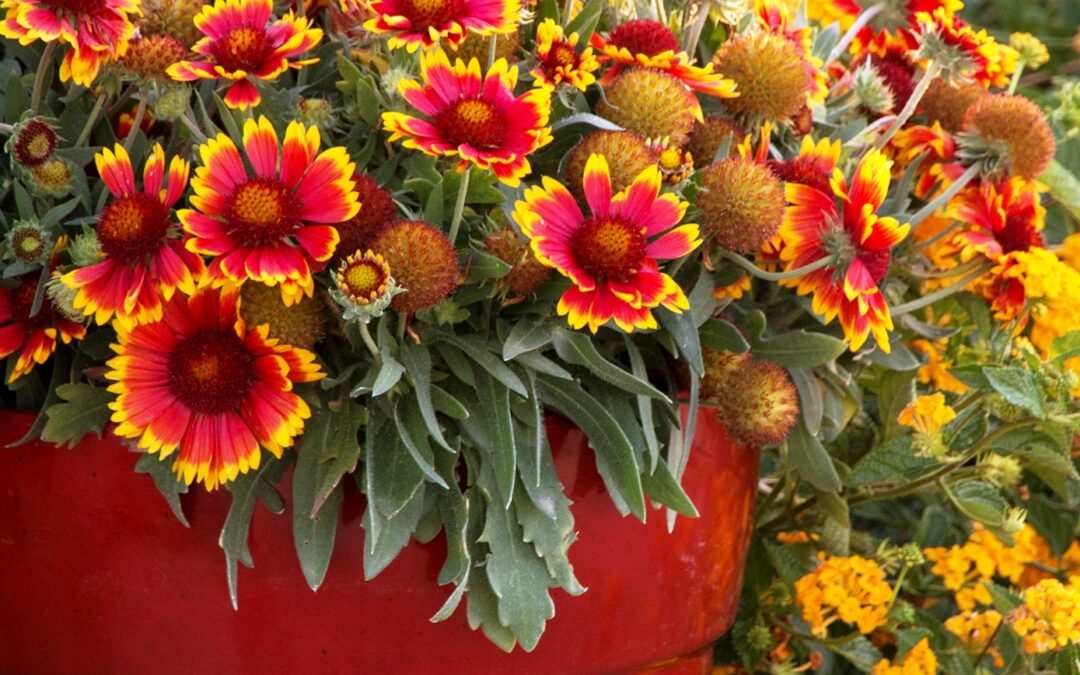Perennial Flowers with the Longest Lifespans
by Lisa Watters-Lain, Arizona’s garden gal
It’s frustrating to design a new flowerbed around your favorite perennial flowers, like delphiniums, Shasta daisies, and pincushion flower, only to see them peter out after three or four years. Here is a list of perennial flowers notorious for their longevity. These are the bloomers you see in old neighborhoods, planted when the homes were first built and still blooming decades later. Plant these in June, and use the money you save in subsequent growing seasons for lush hanging baskets and container gardens. Here are the Top Twelve longest-living perennials. Find them at Watters Garden Center, or buy them online.
Balloon flowers deliver that coveted shade of blue that blends well in any garden, without the finicky needs some blue flowers exhibit. These flowers endure a wide range of temperatures and conditions in full sun or partially shady gardens. Once settled in, balloon flowers rarely need dividing and don’t require deadheading. However, shearing may produce a second flush of blooms at the end of summer.
Black-eyed Susan plants thrive in full-sun containers and beds. Their yellow or rusty red flowers with black centers bloom summer through fall and attract birds, butterflies, and beneficial insects.
Butterfly Weed is perfect for anyone who cares about the future of Monarch butterflies. The desirable attributes earned this butterfly weed Plant of the Year in 2017. Bright orange flowers are drought tolerant and disease- and pest-free.
Daylily clumps still grow on old homesteads, which gives you a clue about the tenacity of the versatile plant. If you like orange hues, try a hybrid like the more civilized ‘Orange Crush.’ Or, branch out to many shades of the rainbow. Drought tolerant and nearly pest-free, some consider daylilies an essential part of any landscape.
Perennial Geraniums are tough and return in Alaska and Siberia’s unforgiving climates, unlike the annual geraniums found at Watters Garden Center. In addition to the delicate flowers, gardeners appreciate the ornamental foliage, which features divided leaves with dark-colored bands.
Hellebore or Lenten rose fills two difficult niches: it thrives for years in shady spots and blooms well before the last frost has kissed the landscape. Newer cultivars found at the garden center are bigger and brighter. ‘Pink Frost’ is notable for its large and upward-facing flowers.
Iris is an easy perennial to include in your deer-resistant garden for late spring to early summer blooms. Although not invasive, irises do need dividing every few years to maintain vigor. Share a few rhizomes with friends, so they can enjoy the same knee-high flower spikes in their gardens.
Liatris offers fluffy stems, which you may have noticed in your cut flower arrangements and wondered where this exotic bloom came from. This North American wildflower grows on grasslands, nourishing butterflies and bees with nectar-rich flowers that bloom from the top down.
Lungwort (Pulmonaria) is often blooming before other perennials have emerged from the garden. Petite white, pink, and blue flowers complement the highly ornamental foliage with interesting white freckles. Give it ample moisture, rich soil, and watch a few plants multiply into a dozen over the seasons in your woodland garden.
Peony offers larger, colorful varieties your grandmother would fall in love with. Just ask any bride who pays a premium to include these softball-sized, fragrant blooms in her bouquet. These hardy mountain varieties take the brutal sun and wind for decades of perennial enjoyment. Deer and javelina will ignore these blooming beauties.
Sedums are so tough they survive such insults as being rudely yanked from the garden and replanted by a toddler with a shovel. Plump, succulent foliage contributes to the vigor of sedum, retaining moisture during periods of drought. Sedums like the popular ‘Autumn Joy’ or the dramatic ‘Bronze Carpet’ attract pollinators and thrive in mountain clay.
Sunset Blanket Flower’s perpetual, vibrant red flowers do not fade in the summer heat. Blooms from late spring right until frost if spent blooms are deadheaded regularly. It is showy and easy to grow in addition to sunny beds, borders, and container gardens that are both deer- and javelina-proof.
Until the next issue, I’ll be helping gardeners choose the prettiest flowers here at Watters Garden Center.
Throughout the week, Lisa Watters-Lain can be found at Watters Garden Center, 1815 W. Iron Springs Road in Prescott, or contacted through her website at WattersGardenCenter.com or Top10Plants.com.

